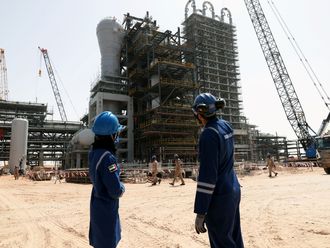Gold played a crucial role as a dominant sector in 16th century Spanish economy just like the role currently being played by oil in petroleum producing countries at present.
There is a very recent experience on the role of raw materials in modern economies during 1980s and 1990s, when Britain became the key producer of oil and gas in the world. Although Britain is not an oil exporting country, but was a self-independent country that time, thus saving billions of dollars it used to pay against its oil imports.
Other countries can benefit from this experience by drawing lessons and avoiding mistakes.
Britain’s experience reflected positively on all components of the British economy. In addition to stimulating economy, Britain managed to produce 3 million oil barrels a day in 1999, which reflected positively on the balance of payment and the country’s incomes in general.
With declining oil and gas production in the recent years and Britain’s returning to be importer once again, oil output fell by 17 per cent to one million barrels a day this year, compared to 2011.
While, gas production fell by 21 per cent in the same period, according to statements by former British Energy Minister Charles Hendry. This accompanied by negative repercussions which are approximately equal to the positive repercussions that accompanied the beginnings of North Sea oil production.
However, the situation in the global oil market has completely changed, oil prices have increased more than three times, and other countries like Russia have turned to be a major source of oil.
Meanwhile, emerging countries, such as China and India, have joined the club of biggest oil importers, to compete with traditional consumer countries, such as Western Europe, the United States (US) and Japan, with all the consequent direct impact on prices.
Despite the importance of this to the oil industry, the focus will be on issues affecting the UK economy, especially those related to the decline in oil and gas production, which are severe effects with deep economic and political and social dimensions, where oil fields in the North Sea fields are expected to be depleted by 2020, unless there are new oil discoveries.
Although the British economy overcome the economic recession before other advanced economies that have suffered from the global financial crisis, thanks to the combination of quantitative management and austerity methods which referred to in a previous article two weeks ago, the British economy and the coalition government led by David Cameron are facing real challenges resulting from the declining oil production and high energy prices.
All of these developments led to a general state of complaint that threatens the growth of the British economy and survival of the current government.
In addition to the loss of oil revenues, the bill of imports has risen, forcing oil companies to increase prices considerably. As a result, the British government has been caught between economic hardships and public complaint resulting from high prices, prompting the Prime Minister to make promises, including applying pressure on companies to cut prices in the coming period.
In fact, there are only two choices or probabilities for Cameron to resolve this crisis, both of which do not have significant potential for application. The first one is to put pressure on oil companies to cut prices, as promised by the Prime Minister.
However, Cameron does not have the necessary tools to pressurise companies that are unlikely to respond to this call, which is linked to the performance and profits of these companies; especially they are joint stock companies listed on the London Stock Exchange, which may subject financial market to an indispensable shake.
The second choice, which the government has the possibility to apply it in theory, not in practice, is the reduction of taxes on oil and gas. Yet, the British economy and the State budget, which look for new resources, can not tolerate such reduction.
This is a recent experience related to the possible consequences that may result from a decline in oil revenues. This experience is good from oil-producing and exporting developing countries, which still have huge oil revenues, to benefit from.
Some oil-exporting countries, such as the UAE, Saudi Arabia and Qatar, have invested huge amounts in production of renewable energy, but there are others, including some GCC countries, are still far from preparing for the post-oil era — an issue which will determine the economic future of oil countries after three decades from now.
This means that these future approaches still need more efforts, while making the most of the British experience which gives very beneficiary and important lessons to others to learn from.











